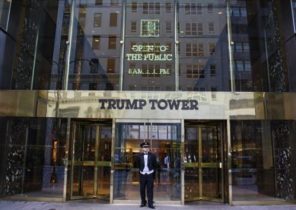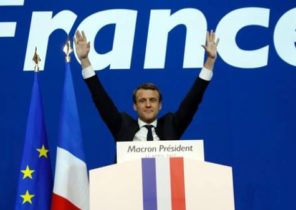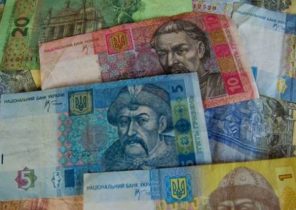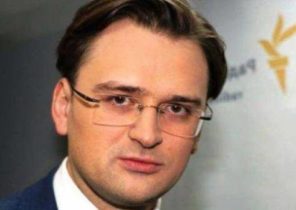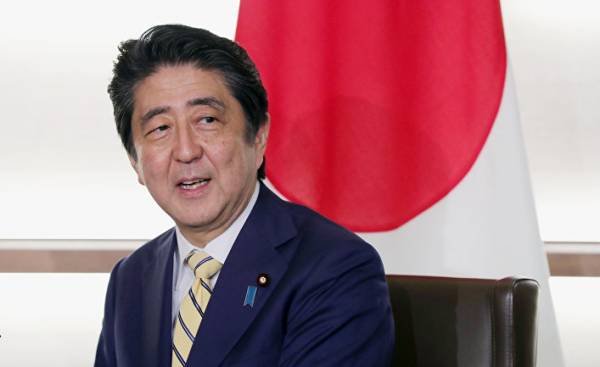
Open the fifth Chapter of human history, says Abe Shinzo (Mushrambo Abe). If the first Chapter was hunting, the second is the cultivation of grain, and the third is industrialization, the fourth Chapter is characterized by computer development. Now begins the Chapter in which all problems can be solved, says Japanese Prime Minister: “Believe in our strength.”
The head of the Japanese government opened the evening on Saturday together with Federal Chancellor Angela Merkel (Angela Merkel) (CDU) in Hannover computer fair, Cebit. His literary description was a kind of a frame for a distinct appeal, which he drew in his speech to the Chancellor and to the representatives of the European Union, he advocated the early conclusion of a trade agreement between Japan and the EU. Prime Minister Abe underlined that growth can only be guaranteed with unity. “Japan wants, together with Germany, to become the countries that support this system,” says Abe.
“Dear Shinzo,” replied the Chancellor, Germany would like to become the motor that will guarantee economic partnership. The fact that Japan is the partner country at the Cebit fair, and the fair present 118 Japanese exhibitors, that is, ten times more than before, is an important milestone for further cooperation. And at a time when there are so many disputes, that “we of Japan do not argue,” is, according to Merkel “a good sign”.
Trump is a shock
Since then, as President of the United States Donald trump went on a protectionist tone, Europe is looking for alternatives. Trump is a shock, because the United States since the second world war has always been the flagship of global free trade — are the number one goal for German exports. To become less economically dependent on this, Europe wants to cooperate more closely with Asia. The signal for the start should be a trade agreement with Japan, which scientists have accurately calculated. Performance of one only of the German economy would have grown by 20 billion euros per year, estimated one unpublished study of the Bertelsmann Foundation and the Institute for economic research (ifo-Institut).
The researchers outlined two scenarios of the agreement that the European Union needs to prepare more this year with his sixth in terms of trade partner. Classic agreement under which first of all should be reduced duties on goods would, in their words, a tangible, though still limited effect. The performance of the economy in Europe would have grown to eleven billion Euro per year, and one third would be in Germany. This increase will be established after decade, until all the new rules will not become habitual.
The performance of the German economy would have grown by 20 billion euros a year
This is a classic trade agreement, the European Union has concluded, for example, in 2011, South Korea. Since then, the Asian industrial exports in the country increased by one third. It’s a lot. Much greater economic growth with Japan could be obtained with a more ambitious agreement, which would have decreased not only tariffs but other barriers to trade. For example, European firms would need to have access to Japanese government orders, and would be mutually recognised professional qualifications and food standards.
If it succeeds, then the economic benefits would be much greater than in the classic arrangement. Germany would in the long run 20 billion euros a year more due to the growth performance of the economy, or six times more than in the case of classic agreement. This corresponds to 0.7% of GDP. Better idea of these numbers will help compare: 0.7 percent is more than how the German economy is growing in economically bad years — and about a third of how it grows in very successful years.
“Can we do to go about such an ambitious agreement depends on the political will of both partners”, — says the researcher of the Bertelsmann Foundation Jungbluth Cora (Cora Jungbluth). Between the EU and Japan, there is disagreement. Brussels demands that Tokyo changed the standards in agriculture and especially in other trade barriers. Conversely, the Japanese expect along with concessions in certain other trade barriers favorable conditions for Japanese cars, Europe is still expensive due to the ten percent duty. Also in dispute is the European proposal to create a court for investment. Plan to enter into this agreement at the end of 2016, has failed.
The agreement with Japan should be the beginning
In any case, a new impetus to these negotiations gave protectionist course Donald trump, during a conversation with Federal Chancellor of Germany Angela Merkel on Friday again complained about the alleged dishonesty against the United States. What, for example, Europe is internally pulled away from the free trade agreement TTIP, which has been discussed for several years and was controversial in Germany, which was to establish global standards for the world economy. The agreement with Japan should be the beginning of stronger cooperation with Asia, which will have to join future trade agreements.
For Japan, the failure of the trump from the TPP trade agreement has become a heavy defeat. TRR covered along with the US and Japan and ten other Nations in the Pacific, such as Vietnam, Australia and Mexico. But China, whose desire for power in Asia, Japan needs to slow down with the help of RTR. “With Japan happened as with the EU, President Central States are more reliable partners in world trade,” analyses the Bark Jungblut from the Bertelsmann Foundation. An early conclusion of the EU trade agreement with Japan, the second largest economic power in Asia, in its opinion, would be an important political signal to other Asian countries: while the United States sidelined, Europe enhances its activity and shows that as before there are alternatives to China.
China tries after the failure of the Pacific agreement TRR to collect other Asian countries under a trade agreement called the RCEP — on their own terms. While the government in Beijing wants to make the Treaty more of a classic, the government in Tokyo for the first time clearly said. Tokyo does not want to dictate the terms and committed to a more comprehensive agreement, which then could join other States and outside Asia — for example, in the end, and the United States.
